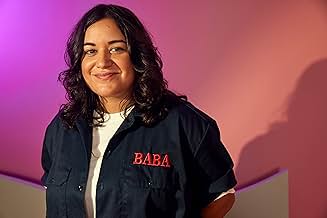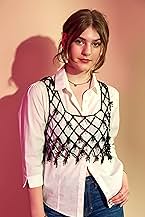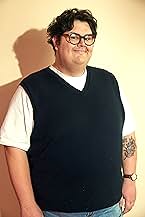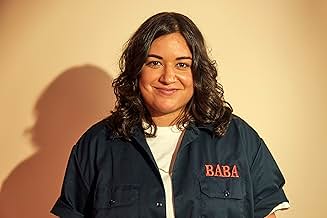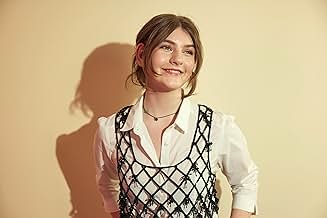AVALIAÇÃO DA IMDb
6,4/10
4,2 mil
SUA AVALIAÇÃO
Sam, uma comediante de stand-up que luta contra o transtorno de estresse pós-traumático, pondera se deve ou não participar da busca por uma adolescente desaparecida da qual ela foi babá.Sam, uma comediante de stand-up que luta contra o transtorno de estresse pós-traumático, pondera se deve ou não participar da busca por uma adolescente desaparecida da qual ela foi babá.Sam, uma comediante de stand-up que luta contra o transtorno de estresse pós-traumático, pondera se deve ou não participar da busca por uma adolescente desaparecida da qual ela foi babá.
- Direção
- Roteirista
- Artistas
- Prêmios
- 8 indicações no total
Avaliações em destaque
"I Used to Be Funny" is a captivating Canadian film that masterfully weaves together raw, heartbreaking moments with a surprising touch of humor. Rachel Sennott's performance shines yet again, reaffirming my unwavering admiration for her talent. As both the lead and a true force on screen, Sennott's portrayal effortlessly captures the complexities of the character's journey.
Ally Pankiw's directorial debut is stellar, showcasing a deep understanding of the human experience. While not flawless, the film's imperfections only add to its authenticity. Pankiw's skillful storytelling draws viewers into the protagonist's world, offering an accurate depiction of life with PTSD. The film's ability to blend these elements in a way that's both poignant and relatable makes it a must-see for anyone seeking a moving cinematic experience.
Ally Pankiw's directorial debut is stellar, showcasing a deep understanding of the human experience. While not flawless, the film's imperfections only add to its authenticity. Pankiw's skillful storytelling draws viewers into the protagonist's world, offering an accurate depiction of life with PTSD. The film's ability to blend these elements in a way that's both poignant and relatable makes it a must-see for anyone seeking a moving cinematic experience.
Comedy is inherent in calling on personal experiences for a joke. Humor is a defense mechanism and a willing tool to break the ice and even recover. Comedy is healing and is used significantly in the film I Used To Be Funny. In a somewhat dark comedy set against the backdrop of the #MeToo era, the film stars Rachel Sennott as a struggling comic battling PTSD who takes part in a search for a missing girl she used to nanny. The film tackles heavy subject matter with airy deftness, and what ties it together is Sennott's arresting performance. In an edgy and humorous film, I Used To Be Funny takes center stage as one of the year's best.
Full review @ Geek Vibes Network.
Full review @ Geek Vibes Network.
Ally Pankiw's feature debut "I Used to be Funny" competently explores fragile experiences of depression and PSTD, recovering from assault, and child endangerment with a tame dose of fragile drama, sprinkled with witty humour.
Pankiw's choice to present the story through sequencing between Sam's mission to find a missing Brooke, the young girl she nannied, and frequent flashbacks of memories of the two's once-close bond. While the concept of a non-linear narrative is meant to efficiently expand the dynamics and pasts of the characters and their journeys, which it technically achieves for the majority of the film. The beginning of this sequence felt static as the vague nature that shrouded the connection between Sam, her trauma, and her past with Brooke, overstayed its welcome in the first third of the story. However, the pace thankfully accelerates once the first clues of Brooke's disappearance are uncovered.
Some elements of the film at times, lean too hard into melodrama that lacks actual substance, especially in the vague and unmoving first third of the film. Cuts to some flashbacks that felt somewhat cliche a script that at times felt too expository, and perhaps two-too-many Phoebe Bridgers needle drops; tools that ask the audience to engage with the characters and the mysterious tragedy that haunts them. These elements may have been appropriate in the context of a television episode, considering Pankiw's background in TV direction, but unfortunately fell flat within a full-length feature film.
Amidst these faults, one of the film's greatest strengths is its talented cast. Rachel Sennott's has not only cemented herself as a star of off-beat and relatable comedy but also demonstrated a striking capacity for performances filled with intense vulnerability, harmoniously embodying all relevant elements of the tragicomedy genre. Her ability to foster chemistry with the rest of the cast only adds further dimension to the sorrow and humor that defines her character's journey.
Overall, I Used to Be Funny poses an intimate image of how trauma can take control of our lives and sense of self-worth. While bleak, the potential for healing is also presented as the empathetic and hopeful conclusion to Sam and Brooke's journey. While the film's approach at times lacks the ingenuity and impact it clearly intended to bring, it remains that Pankiw's strength lies in how she stays firm with the difficult themes and issues she addresses.
Pankiw's choice to present the story through sequencing between Sam's mission to find a missing Brooke, the young girl she nannied, and frequent flashbacks of memories of the two's once-close bond. While the concept of a non-linear narrative is meant to efficiently expand the dynamics and pasts of the characters and their journeys, which it technically achieves for the majority of the film. The beginning of this sequence felt static as the vague nature that shrouded the connection between Sam, her trauma, and her past with Brooke, overstayed its welcome in the first third of the story. However, the pace thankfully accelerates once the first clues of Brooke's disappearance are uncovered.
Some elements of the film at times, lean too hard into melodrama that lacks actual substance, especially in the vague and unmoving first third of the film. Cuts to some flashbacks that felt somewhat cliche a script that at times felt too expository, and perhaps two-too-many Phoebe Bridgers needle drops; tools that ask the audience to engage with the characters and the mysterious tragedy that haunts them. These elements may have been appropriate in the context of a television episode, considering Pankiw's background in TV direction, but unfortunately fell flat within a full-length feature film.
Amidst these faults, one of the film's greatest strengths is its talented cast. Rachel Sennott's has not only cemented herself as a star of off-beat and relatable comedy but also demonstrated a striking capacity for performances filled with intense vulnerability, harmoniously embodying all relevant elements of the tragicomedy genre. Her ability to foster chemistry with the rest of the cast only adds further dimension to the sorrow and humor that defines her character's journey.
Overall, I Used to Be Funny poses an intimate image of how trauma can take control of our lives and sense of self-worth. While bleak, the potential for healing is also presented as the empathetic and hopeful conclusion to Sam and Brooke's journey. While the film's approach at times lacks the ingenuity and impact it clearly intended to bring, it remains that Pankiw's strength lies in how she stays firm with the difficult themes and issues she addresses.
I USED TO BE FUNNY is an above-average mumblecore offering starring Rachel Sennott. Considering how quickly Rachel Sennott has blown up since the confusingly popular BOTTOMS has come out, it almost feels like she owed someone a favor doing this movie. While the movie mostly feels marketed as a comedy, the film itself primarily exists in the realm of heavy-handed drama, and when they do try to infuse comedy, it rarely lands. While the plot is pretty unique and ambitious for this kind of film, it also somehow felt a bit misdirected. On that note, there are certain movies (and often books) that you can consume where you feel almost certain that this story is primarily just something that its writer straight up went through and decided to turn into a feature length media offering - this is 100% one of those movies. My gut tells me that the writer simply went through all of this herself, and decided to tell the story, perhaps primarily because the combination of things feels so specific that it doesn't seem like someone would pair these two themes together any other way, namely the standup comedy details with the nannying plot points. The subject matter isn't interesting enough for someone to focus on without having been through it in reality, I feel, and sadly, it's not quite interesting enough as a movie either. While Sennott's performance is the strongest thing about the entire movie, with it being as dynamic and enjoyable as hers generally are, it doesn't fulfill in many other ways in the end - the only other thing I really found enjoyable in the end was its ambition. Worth watching once for (divine lordess) Sennott fans - not sure who else.
I think the movie 'Funny People' gave me PTSD for movies about comedians. I didn't enjoy that movie much at all and I think I was worried I was going to have a similar experience with 'I Used to be Funny'. That couldn't have been further from the case though. I was glued to the screen for every minute of this film.
Rachel Sennott has been one of the most interesting actresses to watch in recent years, but this film gave her the chance to prove she can truly act in a dramatic role. And she killed it. Also I had never heard of Caleb Hearon until this week and yet now I've seen him steal the show in two films. He has a lot of charm that man.
This is a heavy film. It's gritty and raw and quite devastating at times. I loved the structure of the film, with the intersecting timelines and the mystery around what exactly happened. I will say you have to have your wits about you at times to keep on track of which timeline you are actually in.
I really enjoyed this film. I'm quite surprised to be honest to see it with only a 6.3/10 on IMDb. I feel like I must've seen something in it that others didn't. I highly recommend this one though. 9/10.
Rachel Sennott has been one of the most interesting actresses to watch in recent years, but this film gave her the chance to prove she can truly act in a dramatic role. And she killed it. Also I had never heard of Caleb Hearon until this week and yet now I've seen him steal the show in two films. He has a lot of charm that man.
This is a heavy film. It's gritty and raw and quite devastating at times. I loved the structure of the film, with the intersecting timelines and the mystery around what exactly happened. I will say you have to have your wits about you at times to keep on track of which timeline you are actually in.
I really enjoyed this film. I'm quite surprised to be honest to see it with only a 6.3/10 on IMDb. I feel like I must've seen something in it that others didn't. I highly recommend this one though. 9/10.
Você sabia?
- CuriosidadesDirector Ally Pankiw was dating Muna member Naomi McPherson during the production of the film, but have since broken up. Naomi is still second to the top of special thanks during credits, and two Muna songs feature during the film.
Principais escolhas
Faça login para avaliar e ver a lista de recomendações personalizadas
- How long is I Used to Be Funny?Fornecido pela Alexa
Detalhes
Bilheteria
- Faturamento bruto nos EUA e Canadá
- US$ 171.756
- Fim de semana de estreia nos EUA e Canadá
- US$ 29.499
- 9 de jun. de 2024
- Faturamento bruto mundial
- US$ 171.756
- Tempo de duração1 hora 45 minutos
- Cor
- Proporção
- 2.00 : 1
Contribua para esta página
Sugerir uma alteração ou adicionar conteúdo ausente




